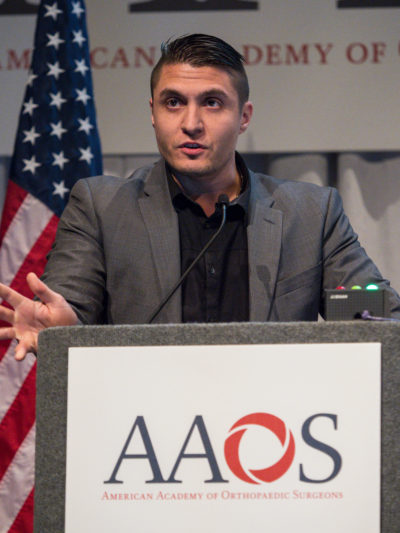First and foremost, clinicians should never purposely upcode/downcode, upcharge/downcharge, or falsely code/document when it comes to the rendering of actual clinical or surgical services provided. That being said, it is worth noting that a physician can have his or her best intentions in these areas, but at the end of the day – incorrect documentation and coding (whether intentional or unintentional) is considered fraudulent practice.
Traditional medical teaching has largely avoided blending business-related topics in the clinical setting as this has never been considered as a pillar of our educational foundation en route to becoming the successful physicians of tomorrow. However, over the last decade I have noticed the convergence of several factors that would inevitably result in documentation and coding teaching becoming a more critical element of residency training:
1. Literature Reports & National Survey
Since the early 2000s, the literature has been peppered with many studies and national surveys reporting homogenous themes and responses from those surveyed:
- In general, these areas are given very little attention during residency training
- Residents, fellows, and attendings at all stages recognize its increasing importance and desire change/implementation
- Residency training education should be as dynamic as the healthcare system it serves.
In fact, if you follow the timeline of the studies and surveys, there is little change evident from the 2003 surveys compared to the more recent ones from 2016.
2. ACGME Logging Requirements
A major component of milestone achievements includes the Accreditation Council for Graduate Medical Education (ACGME) mandated case logging system. As a surgical resident, you will be expected to achieve technical competency in several areas of surgical case groups (i.e. you need X number of total knee replacements in orthopedic residency prior to graduation). Thus, most of us realize that although we may not be taught the actual Current Procedural Terminology (CPT) code for a total knee or total hip replacement, this knowledge base is needed in order to accurately log each of these cases in order to track our milestones.
3. Recognition on a larger scale.
Over a decade ago, the American Academy of Orthopedic Surgeons (AAOS) started incorporating a practice management section as part of its educational subtopics. In my eyes, this reinforced that this was becoming an increasingly important area in our field.
4. Government regulations and recognition.
In 2013, the Centers for Medicare and Medicaid Services (CMS) reported that a major component of improper payments and wasted healthcare dollars were attributed, either directly or indirectly, to improper billing, incorrect clinical documentation, and improper coding submissions. Prior to 2013, several reports were also surfacing, and each report began to mention with increasing frequency the necessity of targeting the implementation of teaching and training in these areas while physicians were still in training.
5. Avoiding fraudulent practice.
Beyond unethical behaviors (which I do not intend to cover in this blog post), my passion and interest were further heightened by the motivating factor of avoiding fraudulent clinical practice. I think little needs to be said for this fact.
Respect the Game, and Play by the Rules
I used to feel an inner conflict when I found myself inquiring into the business side of how we make money for the services we provide. I think this has also contributed, at least in part, to these areas being marginalized in our training. The business side has always been considered taboo – we are taught to focus solely on what really matters – caring for our patients.
While I agree that patient care should be our primary focus – we also must consider the dynamic and evolving healthcare system in which we practice. As our healthcare system becomes increasingly cost-conscientious, physicians are being scrutinized to an increasing degree in all areas and best standards of practice. The 2013 CMS report highlighted the increasing importance — physicians can be audited, fined, and even serve jail time for incorrectly documenting and coding.
If you step back and consider this situation from 50,000 feet, the reality of the situation clearly comes into view. Physicians are held to a standard of knowing (and being trained in) the best and most accurate clinical documentation and coding practices, yet we must recognize that this is not inherently built into our foundation of training. In my experiences, there are very few new attendings who feel that they have been trained to meet these standards.
I think one of my mentors said it best when I was early on in residency. I began to question why we had to do xyz “clicks” or include specific sentences in our documentation just to ensure we met a specific set of required guidelines. My mentor said to me,
“In many ways, some of the checkboxes and nuances are not particularly relevant to the actual care we have provided, but you begin to realize as you move along in training that this is a game with several rules to follow, and you should not be ashamed for knowing the rules.”
“In many ways, some of the checkboxes and nuances are not particularly relevant to the actual care we have provided, but you begin to realize as you move along in training that this is a game with several rules to follow, and you should not be ashamed for knowing the rules.”
He was right, I began to increasingly appreciate that this was a highly regulated game with an incessant number of rules to follow. In order to play the game, you should know the rules.
Personal Residency Training Experiences
Being able to accurately document and code has been somewhat of a passion of mine since I was an intern in residency. I can remember first appreciating its potential importance as I observed new attendings struggle with knowing exactly what is necessary for clinical documentation in conjunction with ethically and accurately coding for the services he or she provided.
Implementing change
When I was a PGY-3, I began to more aggressively pursue educational curriculum adjustments. I realized that with all of our residency milestones and case volume requirements, the curriculum was unable to accommodate the addition of any supplemental training topics.
Thus, I prepared my own project, detailed below:
I organized a 45-minute educational session with the most basic goal of introducing these topics to residents. My goal was to repeat the session on an annual basis and our program would essentially be ahead of the curve of most residency training programs.
The project eventually expanded to other residency training programs and achieved similar positive results. Resident knowledge in these areas was significantly improved. My project had turned into a huge success, and I even published the study protocol and results the Journal of Surgical Education. I was also subsequently contacted by many residents in other residency training programs, including different subspecialty programs, regarding my ideas and my protocol. I began to realize that this was a deficiency in many programs, regardless of subspecialty.
Validation
A final point of emphasis on the importance of these topics is the fact that this year a “practice management” section was added to the orthopedic in-training examination (OITE). Is everyone listening now? Good!
The Wrap-Up
I hope this blog post has you at least considering the importance of paying attention to these areas as you move along in your training. If you are in a program that has already recognized the importance and relevance of these concepts – that is great, you are ahead of the curve. If not, I will conclude with some suggestions as to how you can become more knowledgeable in these areas:
Pay attention.
The more proactive you are, the better. Asking your attendings how they go about coding for office visits and/or surgical procedures should be encouraged. You can then utilize this feedback to help you more accurately log your cases with the ACGME case logs online.
Establish a relationship with the office billing/coding department.
This should not substitute for clinical teaching/learning time. However, one of the ways I learned the subtle differences in when to appropriate assign CPT code X versus CPT code Y came via direct feedback from the individuals in the coding/billing department. Note that many times these individuals will adjust your CPT codes and NOT provide direct feedback. This can result in years of incorrect ignorant coding practices. Best to learn the common mistakes early and adjust accordingly.
Utilize your specialty organizations.
The AAOS (or other applicable organization depending on your field of training) practice management sections are invaluable resources in essentially all elements of your training. These resources often provide the most up-to-date changes made to various documentation and coding guidelines.
Make a “cheat sheet” for the most common procedures.
Memorizing basic codes will free up additional time to search and be proactive when coding for more difficult/complex cases. This can be built off of your own personal logs from the ACGME online system.
Utilize templates.
Templates are a good way to save time. However, recognize the unethical nature of documenting without actual performance to back it up. This is the major pitfall of templates. I suggest to first establish sound practice and clinical physical examination repetition, and as you progress in these areas and it becomes second nature to you – build a Microsoft word document/template for these specific areas.





